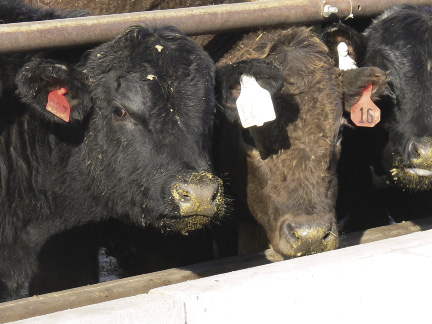Ongoing genomics research in the beef industry may one day soon make it possible for producers to grow cattle that produce meat containing lean protein and good fats yet still provide the great taste today’s consumers look for at the meat counter and potentially help all livestock species.
James Reecy, Iowa State University, has studied various research projects and says certain molecular markers in beef cattle have been able to predict the genetic merit of an animal. By identifying these markers, certain traits, such as growth, meat quality, diseases resistance and more could be controlled. If genetic superiority or inferiority can be predicted, you can make the selection for it without having to directly measure that trait, keeping costs to a minimum. For example, meat tenderness had to be measured after the animal was slaughtered, but looking at molecular markers, researchers are searching for ways to determine meat tenderness without having to kill the animal.
Soyatech Newsroom, April 2013
Increasing milk’s nutrition
Research at Oregon State University found that dairy cows fed flaxseed produced more nutritious milk that had more omega-3 fatty acids and less saturated fat. Diets rich in saturated fat can increase cholesterol and those rich in omega-3 and other fatty acids can reduce the risk of
-heart disease.
Traditionally, cows are fed a mix of corn, grains, silage and hay and produce milk with a lower concentration of omega-3. The cows in this study were fed up to seven percent of their daily diet of flaxseed without negatively affecting their production or the quality of milk.
ScienceDaily, January 2013
UCLA researchers have genetically engineered a tomato that produces a peptide, 6F, which mimics the actions of good cholesterol when consumed. This is especially important with all the focus on improving cardiovascular health.
Researchers fed the tomatoes to mice that lacked the ability to remove low-density lipoprotein (LDL or “bad” cholesterol) from their blood and readily developed inflammation and atherosclerosis when consuming a high-fat diet. The investigators found that mice that ate the peptide-enhanced tomatoes, which accounted for 2.2% of their Western-style, high-fat diet, had significantly lower levels of inflammation and less atherosclerotic plaque.
EmaxHealth, March 2013
 Tapping into new kind of syrup
Tapping into new kind of syrup
New Hampshire is finding its claim to fame in birch syrup. Unlike maple syrup from nearby Vermont, birch syrup taste completely different and can be sold for a higher price. With the industry growing in Canada and Alaska, although with a high cost of materials and transportation, Cornell University is studying this venture for the northeastern U.S. to see how much syrup can be made and at what price.
Maple syrup producers have the infrastructure so as soon as maple season is over, they can start with birch.
Associated Press, April 1, 2013


